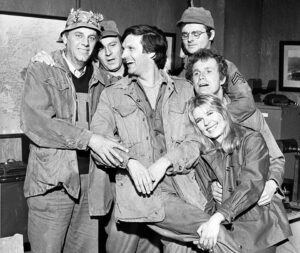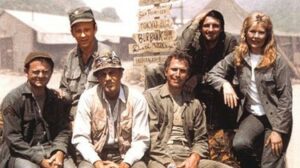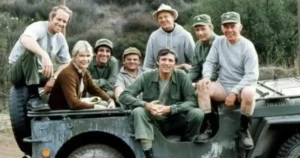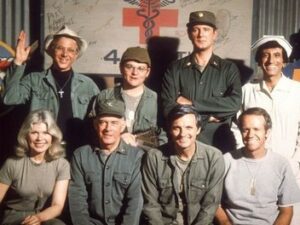MAS*H remains one of television’s most beloved series, but beneath its familiar surface lie countless secrets about the 4077th’s unforgettable characters. After eleven seasons and 256 episodes, these doctors, nurses, and soldiers became family to millions of viewers. Yet even the most devoted fans might be surprised by the hidden layers, real-life inspirations, and behind-the-scenes decisions that shaped these iconic personalities.
Hawkeye Pierce’s Real-Life Counterpart
Alan Alda’s portrayal of Captain Benjamin Franklin “Hawkeye” Pierce defined the series, but few realize the character was based on Dr. H. Richard Hornberger, who wrote the original MAS*H novel under the pseudonym Richard Hooker. Hornberger served as a surgeon during the Korean War and witnessed the exact blend of humor and horror that became the show’s trademark. Interestingly, Hornberger later expressed mixed feelings about how the TV series evolved, particularly its increasingly anti-war stance. The real surgeon was more conservative than his fictional counterpart, creating an fascinating disconnect between creator and creation.
Alda himself brought unexpected depth to Hawkeye by insisting the character grow more serious over time. Early scripts portrayed him as purely comedic, but Alda fought for episodes exploring post-traumatic stress, moral injury, and the psychological toll of war. This evolution culminated in the series finale, where Hawkeye’s mental breakdown became one of television’s most powerful moments.

The Radar O’Reilly Paradox
Corporal Walter “Radar” O’Reilly possessed an almost supernatural ability to anticipate needs before they were spoken. This wasn’t just a quirky character trait—Gary Burghoff, who played Radar, actually had a congenital deformity affecting his left hand. The show cleverly concealed this throughout the series using strategic camera angles, props, and positioning. Watch closely, and you’ll notice Radar always carries his clipboard in his left hand or keeps that hand in his pocket.
Another little-known fact: Burghoff was the only actor to reprise his role from the 1970 film version. His portrayal was so definitive that the producers couldn’t imagine anyone else bringing Radar’s innocent wisdom to life. When Burghoff decided to leave the show in 1979, the writers faced their biggest challenge—how to say goodbye to the character who represented the unit’s heart and soul.
Margaret “Hot Lips” Houlihan’s Transformation
Major Margaret Houlihan underwent television’s most remarkable character evolution. Initially portrayed as a one-dimensional antagonist and the butt of jokes about her affair with Frank Burns, Loretta Swit fought tirelessly to give Margaret depth, dignity, and dimension. The nickname “Hot Lips” came from a humiliating early episode where Hawkeye and Trapper broadcast her intimate moment with Frank throughout the camp. Yet Margaret transformed from caricature to complex woman, becoming a feminist icon who balanced military discipline with genuine compassion.
Swit turned down the role of Christine Cagney in “Cagney & Lacey” to stay with MAS*H, a decision she never regretted. She understood that Margaret’s journey from rigid army nurse to empathetic leader represented something groundbreaking for women on television. The episode where Margaret’s marriage crumbles revealed vulnerability that made her fully human, not just a supporting character in the men’s stories.

Frank Burns Was Never Supposed to Last
Larry Linville’s portrayal of Major Frank Burns was so effectively irritating that many viewers assumed the actor was equally unpleasant. Nothing could be further from the truth. Linville was a classically trained actor who deliberately played Frank as incompetent and insecure because he understood the character’s purpose. What few realize is that Frank was originally intended as a temporary antagonist, but Linville’s performance was so memorable that writers kept him for five seasons.
Linville actually requested to leave the show because he felt Frank had nowhere left to grow. The character was written into a corner—too foolish to be taken seriously, too mean to be sympathetic. Linville’s departure allowed the introduction of Charles Winchester, a more sophisticated foil who could match wits with Hawkeye and BJ.
The Father Mulcahy Mystery
Two different actors played Father Francis Mulcahy, and the transition reveals fascinating behind-the-scenes drama. George Morgan played the chaplain in the pilot episode, but William Christopher took over starting with episode two. Christopher brought a gentle humor and quiet strength that made Mulcahy indispensable, yet the character remained perpetually underutilized. Writers often struggled to integrate the chaplain into medical storylines, leading to episodes where Mulcahy barely appeared.
Christopher’s real-life son had autism, which deeply informed his portrayal. The compassion and patience Mulcahy showed to troubled soldiers reflected Christopher’s own experiences as a father navigating challenges with grace. In later seasons, writers gave Mulcahy hearing loss, a condition that Christopher specifically requested to highlight the invisible injuries of war.

The Winchester Sophistication
When Charles Emerson Winchester III arrived in Season 6, he represented everything the 4077th wasn’t—wealthy, cultured, and unapologetically elitist. David Ogden Stiers created a character who could be both antagonist and ally, someone whose superiority complex masked genuine skill and occasional kindness. Winchester’s complexity made him far more interesting than Frank Burns ever was.
Stiers based Winchester’s Boston Brahmin accent and manner on actual members of that social class, bringing authenticity to the character’s aristocratic background. The writers rewarded this nuance with episodes exploring Winchester’s hidden generosity, his relationship with his sister, and his surprising moments of humility. Unlike Frank, who was purely comic relief, Winchester could carry dramatic weight.
The Klinger Revelation
Corporal Maxwell Klinger’s desperate attempts to earn a psychiatric discharge by wearing dresses became one of the show’s most memorable running gags. Yet this comedic device evolved into something more meaningful. Jamie Farr, who played Klinger, was actually from Toledo, Ohio—just like his character. This wasn’t coincidence; Farr suggested the hometown connection, and writers incorporated his real-life experiences and Lebanese heritage into Klinger’s backstory.
As the series progressed, Klinger stopped wearing dresses and became the company clerk after Radar’s departure. This transition reflected changing attitudes and the character’s growth from desperate soldier to dedicated professional. Klinger’s eventual marriage to Soon-Lee and decision to stay in Korea after the war ended provided one of the series’ most touching conclusions.

The Colonel Blake Tragedy
McLean Stevenson’s departure as Lieutenant Colonel Henry Blake shocked audiences, but the manner of his exit—killed in a plane crash while heading home—traumatized viewers and cast members alike. The actors weren’t told about Blake’s death until they filmed the final scene, and their reactions were genuinely raw. This controversial decision demonstrated that MAS*H wasn’t afraid to show war’s randomness and cruelty.
What many don’t know is that Stevenson later regretted leaving the show, watching it continue successfully for eight more seasons without him. His departure forced writers to mature the series, bringing in Colonel Potter and shifting from pure comedy toward dramedy.
The Potter Wisdom
Harry Morgan’s Colonel Sherman T. Potter brought stability and warmth that the 4077th desperately needed after Blake’s death. Morgan was initially concerned about replacing a beloved character, but his portrayal of Potter as a career military man with genuine humanity won audiences immediately. Potter’s love for his wife Mildred, his horse Sophie, and his painting hobby revealed a fully realized person, not just a commanding officer.

Morgan had actually appeared in an earlier episode playing a different character—a crazy general. The producers loved him so much they brought him back as Potter, gambling that audiences wouldn’t remember or care about the continuity error. They were right.
These hidden details remind us that MAS*H succeeded because every character, from leads to supporting players, possessed depth and authenticity. The 4077th Mobile Army Surgical Hospital became real because the peopl